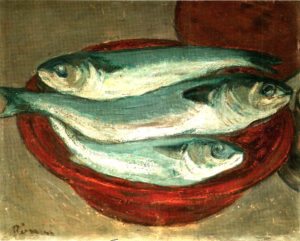"A kindness is never lost, even if you throw it into the water."
 This is the theme of the "The Talking Fish". A folktale from Armenia, The Talking Fish tells the story of a poor, desperate fisherman's assistant who throws a magical talking fish back into the sea and is fired. On his way home, downtrodden and depressed, he comes upon a "monster" whom offers him a cow to sustain his life for the next three years, but when the monster returns, he must repay him by answering three questions lest he, his wife and the cow become the monsters' property. Seeing no other way, the fisherman agrees. Three years later the monster returns, but how is the poor fisherman to answer his absurd questions? "A kindness is always repaid". Click here to find out the magical ending to this story...
This is the theme of the "The Talking Fish". A folktale from Armenia, The Talking Fish tells the story of a poor, desperate fisherman's assistant who throws a magical talking fish back into the sea and is fired. On his way home, downtrodden and depressed, he comes upon a "monster" whom offers him a cow to sustain his life for the next three years, but when the monster returns, he must repay him by answering three questions lest he, his wife and the cow become the monsters' property. Seeing no other way, the fisherman agrees. Three years later the monster returns, but how is the poor fisherman to answer his absurd questions? "A kindness is always repaid". Click here to find out the magical ending to this story...
This short story provides an opportunity to cover ELA skills on "Making Predictions and Drawing Conclusions" while also focusing on Character Education and Kindness. In the beginning of the story, students can draw conclusions about the type of character the fisherman was for throwing the fish back despite his poor disposition and possible loss of his job. They can then predict what will happen after the man foolishly agrees to the terms of the monster. Finally, students can predict/draw conclusions on if and how "The Talking Fish" might repay the fisherman's kindness. Lastly, students can work on Determining
Theme through explicit text: What does the final statement mean: “A kindness is never lost, even if you throw it
into the water.”?
My sons are in 2nd grade and Kindergarten and their school theme this year is KINDNESS. They talk about the books "How Full is Your Bucket" and "Have you Filled a Bucket Today". The Principal even went into each class to read these stories to the students. Classes are focused on teaching students to be a "Bucket Filler" not a "Bucket Dipper". Kids write post-its and put them into a Kindness bucket when a fellow class member does something to "fill their bucket". I mention this because our story "The Talking Fish" and many of our other stories teach these important themes effortlessly. They can easily be shared in class as mini-lessons, not only to teach ELA standards, but to work on Character Education. We all want our students and children to be successful with their grades, but most importantly, I think, we want them to be KIND. Happy Storytelling!

No comments:
Post a Comment